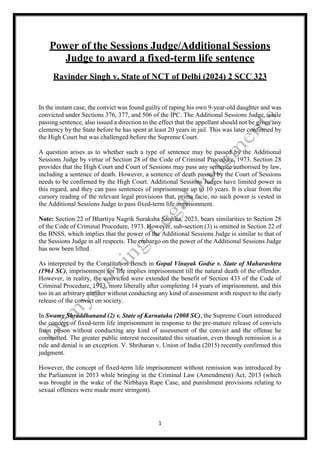Power of the Sessions Judge/Additional Sessions Judge to award a fixed-term life sentence
•
0 likes•15 views
In this recently delivered judgment, the Supreme Court decided the legal issue whether Additional Sessions Judge can award fixed term life imprisonment or not?
Report
Share
Report
Share
Download to read offline

Recommended
More Related Content
Similar to Power of the Sessions Judge/Additional Sessions Judge to award a fixed-term life sentence
Similar to Power of the Sessions Judge/Additional Sessions Judge to award a fixed-term life sentence (20)
Right of Accused – Legla Aid, Double Jeopardy and Custodial Torture

Right of Accused – Legla Aid, Double Jeopardy and Custodial Torture
Arrest and Detention Under Code of Civil Procedure; A Critique.pptx

Arrest and Detention Under Code of Civil Procedure; A Critique.pptx
Recently uploaded
Recently uploaded (20)
Smarp Snapshot 210 -- Google's Social Media Ad Fraud & Disinformation Strategy

Smarp Snapshot 210 -- Google's Social Media Ad Fraud & Disinformation Strategy
Power of the Sessions Judge/Additional Sessions Judge to award a fixed-term life sentence
- 1. 1 Power of the Sessions Judge/Additional Sessions Judge to award a fixed-term life sentence Ravinder Singh v. State of NCT of Delhi (2024) 2 SCC 323 In the instant case, the convict was found guilty of raping his own 9-year-old daughter and was convicted under Sections 376, 377, and 506 of the IPC. The Additional Sessions Judge, while passing sentence, also issued a direction to the effect that the appellant should not be given any clemency by the State before he has spent at least 20 years in jail. This was later confirmed by the High Court but was challenged before the Supreme Court. A question arises as to whether such a type of sentence may be passed by the Additional Sessions Judge by virtue of Section 28 of the Code of Criminal Procedure, 1973. Section 28 provides that the High Court and Court of Sessions may pass any sentence authorised by law, including a sentence of death. However, a sentence of death passed by the Court of Sessions needs to be confirmed by the High Court. Additional Sessions Judges have limited power in this regard, and they can pass sentences of imprisonment up to 10 years. It is clear from the cursory reading of the relevant legal provisions that, prima facie, no such power is vested in the Additional Sessions Judge to pass fixed-term life imprisonment. Note: Section 22 of Bhartiya Nagrik Suraksha Sanhita, 2023, bears similarities to Section 28 of the Code of Criminal Procedure, 1973. However, sub-section (3) is omitted in Section 22 of the BNSS, which implies that the power of the Additional Sessions Judge is similar to that of the Sessions Judge in all respects. The embargo on the power of the Additional Sessions Judge has now been lifted. As interpreted by the Constitution Bench in Gopal Vinayak Godse v. State of Maharashtra (1961 SC), imprisonment for life implies imprisonment till the natural death of the offender. However, in reality, the convicted were extended the benefit of Section 433 of the Code of Criminal Procedure, 1973, more liberally after completing 14 years of imprisonment, and this too in an arbitrary manner without conducting any kind of assessment with respect to the early release of the convict on society. In Swamy Shraddhanand (2) v. State of Karnataka (2008 SC), the Supreme Court introduced the concept of fixed-term life imprisonment in response to the pre-mature release of convicts from prison without conducting any kind of assessment of the convict and the offense he committed. The greater public interest necessitated this situation, even though remission is a rule and denial is an exception. V. Shriharan v. Union of India (2015) recently confirmed this judgment. However, the concept of fixed-term life imprisonment without remission was introduced by the Parliament in 2013 while bringing in the Criminal Law (Amendment) Act, 2013 (which was brought in the wake of the Nirbhaya Rape Case, and punishment provisions relating to sexual offences were made more stringent).
- 2. 2 However, under these provisions, the courts may impose sentences in accordance with the law and cannot issue additional directives stating that the accused will not receive remission before the end of a specific term, such as twenty years. The law does not warrant such a direction and cannot uphold it. In the instant case, the Additional Sessions Judge passed such a direction while awarding a sentence to the accused. The High Court affirmed the direction. Since this power can be exercised only by the High Courts and Supreme Court, the Supreme Court took serious note of this situation and held that passing such direction in the exercise of its constitutional powers is quite different from just affirming the direction of the Additional Sessions Judge, particularly when no such power is vested in the Additional Sessions Judge. Further, it was reiterated that with regard to special category sentencing to life imprisonment in excess of 14 years by fixing a longer term would be available to the High Courts and Supreme Court, even in cases where the maximum punishment, permissible in law and duly imposed, is life imprisonment with nothing further. Since the offence was committed before the enforcement of the Criminal Law (Amendment) Act, 2013, the accused got the benefit of Article 20(1) of the Constitution and could not be awarded a sentence under the amended stringent provisions. However, considering the gravity of the facts, the Supreme Court awarded 20 years of fixed-term life imprisonment to the convict. Gauri Shankar v. State of Punjab (2021) 3 SCC 380 and Shiv Kumar v. State of Karnataka (2023) 9 SCC 817 raised a similar issue about the Sessions Judge's power and received the appropriate response. PS: Copyright protects the content that appears here.
